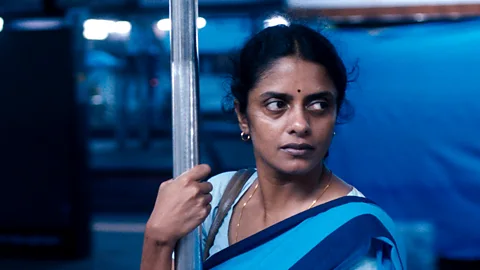 Courtesy Cannes Film Festival
Courtesy Cannes Film Festival“Lyrical” and “delicate”, Payal Kapadia’s universal, emotional film, premiering at Cannes, will “win hearts everywhere”.
The best known cinematic homages to big cities at night time are films about New York, Paris, Rome and Vienna. But now that list will have to make room for All We Imagine as Light, Payal Kapadia’s magical ode to nocturnal Mumbai, which premiered at the Cannes Film Festival on Thursday. Most of it is set after dark, when the frantic metropolis’s honking car horns are muffled by the pouring rain, when the hazy electric lights cast a romantic glow, and when people feel the ache of the yearnings they can ignore during the bustling daylight hours.
Kapadia’s first feature film, A Night of Knowing Nothing, was a documentary with a few fictionalised elements, and All We Imagine as Light seems initially to take a similar approach: in the opening minutes, people glance at the camera as they clear up rubbish, set out market stalls, and queue for commuter trains, and their voiceovers muse on the magnetic appeal of the “city of dreams”. But the film soon becomes an ensemble drama about three strong women who work in the same hospital. They are all depicted without sentimentality, but with such respect and affection that audiences will fall in love with them.
The central character is Prabha (Kani Kusruti), a dedicated, serious-minded nurse whose husband moved to Germany to work in a factory immediately after their arranged marriage. He hasn’t phoned her in more than a year, but she still dreams of his return, despite the tentative advances of a kindly doctor who writes poems and bakes desserts for her.
All We Imagine as Light
Director: Payal Kapadia
Cast: Kani Kusruti, Chhaya Kadam, Divya Prabha,
Run time: 1hr 55min
All We Imagine as Light is a delicate triple portrait of women who have devoted their lives to helping others, but have received precious little in return in terms of money, status or freedom. Things would be different if they were men: the film’s feminist theme is established in the amusing introductory scenes, in which an elderly patient complains to Prabha that the ghost of her late husband keeps bothering her when she’s trying to watch television, and Anu slips a bottle of contraceptive pills to a 25-year-old woman who already has three children.
But Kapadia doesn’t resort to polemic, nor does she try to force the narrative into tragedy or farce. In her clear, lyrical way, she simply tells the bittersweet stories of three friends who want nothing more than to be allowed to carry on as they are. All We Imagine as Light is specific in its detailing of life as a woman in today’s Mumbai, but this Indian-French co-production also has the feel of an American or European indie comedy drama. It is universal and emotional enough to hypnotise anyone who has been alone in a city, or been spellbound by a film on the subject.
It’s also noteworthy for being the first Indian film from a female director ever to be in the main Competition strand at Cannes. Given that the Competition jury is chaired by Greta Gerwig, and this warm, female-led film resembles her own work in certain ways, All We Imagine as Light could well be a winner when the Festival’s prizes are announced on Saturday evening. But whether Kapadia takes home a trophy or not, All We Imagine as Light is bound to be one of those international films that break out of the art-house festival circuit and into cinemas and hearts everywhere.










